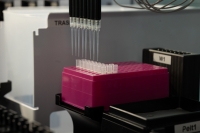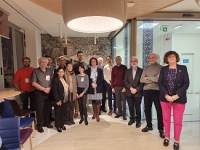News

24/01/2024
From 29 to 30 January 2024, the Food and Agriculture Organization of the United Nations (FAO) will host a technical workshop on whole genome sequencing (WGS) application in water and foodborne disease outbreaks in Lima, Peru. The meeting is being organized jointly with the United States Food and Drug Administration (US FDA).
Global knowledge of pre-harvest factors in food safety with the water quality issue is currently drawing an attention as it is still largely limited. As global water scarcity may result in pushing towards the use of poor-quality water sources, better understanding of the connections between water quality and food safety...

27/12/2023
FAO hosted the Technical Meeting: Gut microbiome in food safety chemical risk assessment which was held from 12 – 14 December 2023. A multiregional and multidisciplinary group of experts – spanning from toxicologists to microbial ecology specialists and involved in chemical risk assessments and microbiome research programmes – discussed the identification of microbiome-related data suitability, gaps and needs for chemical risk assessment, as well as the microbiome-host interactions and its biological relevance.
The experts also identified the conditions and developments that need to take place in order to integrate the different gut microbiome data into chemical risk...

20/12/2023
We sat down with Yousouf Gaungoo, Principal Public Health and Food Safety Inspector and Regional Health Officer in Mauritius, and government coordinator for the EU-funded project “Strengthening food control and phytosanitary capacities and governance.” We wanted to learn more about him and how he got involved in food safety. We also wanted to gain a better understanding of the food control system in Mauritius and how he saw the project potentially impacting the system and food safety in his country.
Can you tell us about yourself? About your background, where you are from and how...

14/12/2023
In a groundbreaking initiative led by the Chilean Food Safety and Quality Agency (ACHIPIA) and the Food and Agriculture Organization of the United Nations (FAO), Chile has become the first country in Latin America to implement a food control system assessment facilitated by FAO. The initiative is meant to improve strategic planning and strengthen governance around food safety.
The launch event for the "Evaluación del sistema de control de los alimentos de Chile” unfolded in Santiago, Chile, from December 11 to 15 with high-profile policymakers in attendance, including Santiago Rojas, Acting Undersecretary of Agriculture and Diego Varela, Executive Secretary of ACHIPIA.
The...

05/12/2023
Rome - Today, the Food and Agriculture Organization (FAO) and the Republic of Korea (ROK) formalised their joint commitment to bolster global food safety with the allocation of US$ 3 million towards the enhancement of global food safety.
This agreement comes at a crucial time when food systems need to transform to become more efficient, while at the same time becoming more resilient, more sustainable, and safer. Foodborne diseases claim the lives of approximately 420,000 individuals annually, with a staggering one-third of the victims being children under the age of five. Foodborne illnesses not only result in...

05/12/2023
The Food and Agriculture Organization of the United Nations (FAO) has released a new publication highlighting the pivotal role of Codex standards in addressing foodborne antimicrobial resistance (AMR).
“Foodborne AMR poses a significant threat to public health, and Codex's contributions are instrumental in mitigating this threat

29/11/2023
The gut microbiome is a dynamic microbial network composed of trillions of microorganisms living in a symbiotic relationship with the host. It plays an important role metabolizing compounds produced by the host, producing essential metabolites such as vitamins, amino acids and short-chain fatty acids and offering protection by stimulating the immune system and contributing to its maturation.
The composition and dynamics of the gut microbiome are more highly dependent on stressors and environmental factors than on host genetics. Therefore, a better understanding of how dietary chemicals can impact the gut microbiome and human health would allow to...

28/11/2023
FAO has just released a report on Food safety implications from the use of environmental inhibitors in agrifood systems, which was developed within the activities of FAO’s Food Safety Foresight Programme. “With foresight, we look at food safety issues that may emerge while globalized agrifood systems evolve in response to challenges such as a growing world population or climate change,” said Vittorio Fattori, FAO Food Safety Officer. “This forward-looking approach provides a better understanding of arising risks and opportunities and helps anticipate possible scenarios as strategic preparedness to ensure safe food regardless of the methods employed in its production.”

27/11/2023
KIGALI, RWANDA —Last week, the government of Rwanda concluded two critical assessments of the country’s food control and phytosanitary systems with final consensus workshops in Kigali where high-level policy makers endorsed the recommendations of the final reports of the assessments and committed to implementing their strategic plans.
The assessments, conducted with the support of FAO’s Food Systems and Food Safety division (ESF) and the International Plant Protection Convention (IPPC) Secretariat, were part of the 5-million-dollar "Strengthening of Capacities and Governance in Food and Phytosanitary Control” project.
The European Union (EU)-funded initiative aims to improve food safety...

24/11/2023
Today the Joint FAO/WHO Expert Committee on Food Additives (JECFA) published its summary report of the 97th meeting.
Held in Rome from October 31 to November 9, the Committee focused on assessing the safety of titanium dioxide (INS 171) and several flavouring agents when used as food additives.
For all substances, JECFA performed a comprehensive risk assessment, which is a four-step scientific process that includes hazard identification, hazard characterization, dietary exposure assessment and risk characterization.
The Committee re-evaluated titanium dioxide and considering the very low oral absorption of INS 171, and the absence of any...
Stay up to date and connect to our RSS feed!
